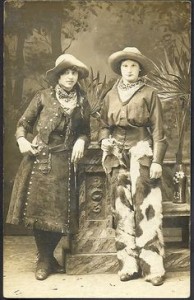
 I just finished the first pass on the slushpile for If This Goes On. The anthology is intended to be half solicited manuscripts; half from the open call, and I’m happy to say that I don’t think it’s going to be hard to pull that together. I’ve got five or six definites on my list right now, and I’m setting them aside. I did read through every story except for a handful of less-than-serious ones; thank you to the slushreaders and publisher Colin Coyle for winnowing those out.
I just finished the first pass on the slushpile for If This Goes On. The anthology is intended to be half solicited manuscripts; half from the open call, and I’m happy to say that I don’t think it’s going to be hard to pull that together. I’ve got five or six definites on my list right now, and I’m setting them aside. I did read through every story except for a handful of less-than-serious ones; thank you to the slushreaders and publisher Colin Coyle for winnowing those out.
If I can, I’ll take one more pass through the first third or so of the slushpile, when I was reading and not knowing how strong some of the submissions would be. I suspect at least a third of those can be winnowed. Then I’ll ask the publisher to send out that round of rejections.
By then I am hoping I’ll have narrowed things down to a few dozen stories. These manuscripts have officially made it to the final round. At this point I’ll be looking at some things that include:
Then will come the final passes, where I’ll be reluctantly saying goodbye to some stories for reasons that might include:
I hope that the slushreaders have learned something from all of this, including a better sense of what submitters may or may not want to avoid, and how varied the slush pile can be. With a few of them we’ve done some talking about stories, but not all. For most slushreaders, I would suggest if you’re passing up more than half the stories, you are not being harsh enough, but if it’s only one in ten, you may be leaving out some stuff the editor will want to see, unless your tastes are perfectly aligned.
...

So I’ll be open to submissions from March 15 through March 31 for the Women Destroying Fantasy issue. Here are some of my wants and a couple of things that will turn me off.
- I want fantasy that showcases the amazing emotional range of the genre and the spectrum of forms it can take.
- I’ll want at least one tearjerker and one humorous piece.
- I’ll want something that draws on fairytale or myth, but which does so in an amazing, interesting, and fresh way, and I’m hoping to find something that feels urban fantasy-ish as well, also in a fresh and interesting way.
- Fantasy that often hits well with me: superheroes, non-cutesy talking animals, linguistic-related, the weird.
- I like language: make yours wonderful, but never at the cost of the story.
- Your character should make me care about their fate (and for this issue, probably a female protagonist is, quite frankly, probably going to be a better fit).
- I’ll want at least one piece with an utterly amazing landscape, that immerses me in a fantasy world that delights my heart.
- Diversity does matter to me. It doesn’t trump quality, but when you’re going to be up against the very best, score your points where you can.
I don’t want retellings of D&D adventures. Or pirates. I really don’t like pirates (got exposed to an awful lot of fantasy pirate stories while at Fantasy Magazine) and I’m not particularly fond of zombies. Typos are another big turn-off: proofread your work.
This is not a time to go for the low-hanging fruit or play it safe. I have four, count ’em, four slots. Send me something — but make it the very best you have, something that is unique to your voice, something that you and only you could write.
...
 I’m glad I’ve got enough students for the Editing 101 online class that starts tonight, but I’d love a couple more. Mention reading this when you mail me about the class and I’ll give you a special deal. 😉
I’m glad I’ve got enough students for the Editing 101 online class that starts tonight, but I’d love a couple more. Mention reading this when you mail me about the class and I’ll give you a special deal. 😉
So what do we do and who is the class aimed at?
The class is aimed both at writers who want to learn to edit their work better as well as editors who want to hone their skills and learn about it as a career path.
Here’s what the three two-hour sessions cover. They’re spaced two weeks apart.
Got questions? I’d be happy to answer them.
...
Want access to a lively community of writers and readers, free writing classes, co-working sessions, special speakers, weekly writing games, random pictures and MORE for as little as $2? Check out Cat’s Patreon campaign.

"(On the writing F&SF workshop) Wanted to crow and say thanks: the first story I wrote after taking your class was my very first sale. Coincidence? nah….thanks so much."

(fantasy, short story) Even Duga the Prestidigitator, who never pays much attention to anything outside his own hands, raised an eyebrow when I announced I’d be hooking the manticore up to my wagon.


This site is protected by reCAPTCHA and the Google Privacy Policy and Terms of Service apply. This site is a participant in the Amazon Services LLC Associates Program, an affiliate advertising program designed to provide a means for sites to earn advertising fees by advertising and linking to Amazon.com.